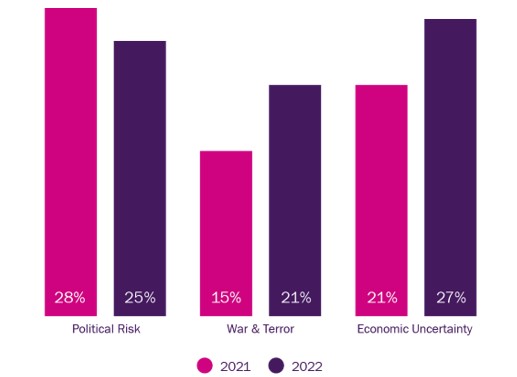Recent geopolitical developments and economic turmoil have significantly altered business leaders’ perceptions of the risks they face and their resilience to those risks, which has fallen dramatically since 2021. The impact of inflation is a cause for particular concern, alongside the fear that global tensions are increasing the threat from external forces.
This is among the findings of Beazley’s latest Risk & Resilience research, published today, which suggests that businesses in the UK and US are struggling to adjust to this new risk environment, and that few business leaders feel well able to manage current geopolitical risks.
Commenting on the findings of the research, Roddy Barnett, Beazley’s head of political risks and trade credit said: “Against a challenging backdrop, business strategies are now at a point of inflection. Even those territories far removed from the theatre of war in Eastern Europe are feeling the impact of global sanctions and commodity shortages on risks across the board from supply chain to cyber to political risk and trade credit.
“Businesses need to know that as we face a moment of geopolitical change, which is fraught with unpredictability, they can protect overseas physical assets and their human capital both at home and abroad, by actively investing in a mixture of risk management and effective insurance cover.”
Key research findings (Source: Beazley)
The report’s results paint a troubling picture.
• It is urgent that business builds its resilience as we face a high risk/low resilience geopolitical environment.
• Inflation is a dominant threat with 55% of business leaders believing they lack the necessary resilience to deal with it, which rises to 65% in the US.
• The proportion of business leaders ranking war and terror as their top risk is up 46% on the previous year.
• Economic uncertainty is up 31% on the year before.
• Rising prices and an unpredictable economic environment are driving instability and civil unrest as we have already seen in Sri Lanka, with countries such as Egypt and Turkey possibly vulnerable too.
• US business must confront the double threat of unpredictability at home from rising gun violence, whilst as a world superpower it is facing up to a watershed in geopolitics as its relationship with Russia and China shifts.
• Business leaders need to better understand their geopolitical risks and prepare for and seek to mitigate them where possible. Specialist political risk, trade credit and terrorism insurers have a role to play in providing appropriate cover that provides the risk mitigation that they need.
Beazley’s research was conducted during January 2022, among 1,000 business leaders and insurance buyers of businesses based in the UK and US with international operations. Of the firms surveyed in both the US and the UK there was an equal split of respondents across company sizes of: US$250,000-US$1m, US$1,000,001-US$10m, S$10,000,001-US$100million, US$100,000,001-US$1bn, more than US$1bn.
Printed Copy:
Would you also like to receive CIR Magazine in print?
Data Use:
We will also send you our free daily email newsletters and other relevant communications, which you can opt out of at any time. Thank you.











YOU MIGHT ALSO LIKE